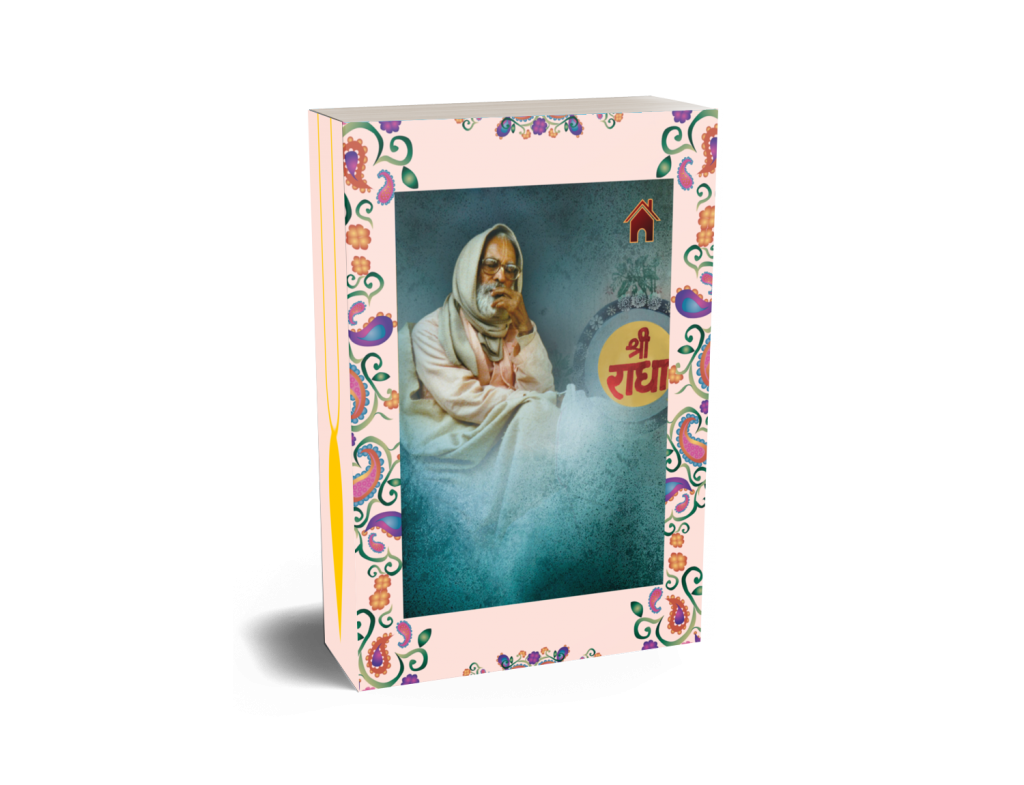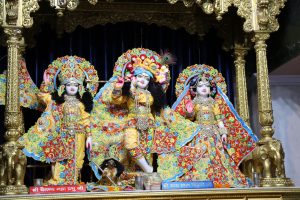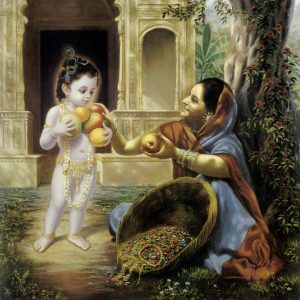

Chapter 11 from the book, Going Beyond Vaikuṇṭha, 4th edition by Śrīla Bhaktivedānta Nārāyaṇa Mahārāja
Upon hearing Gopa-kumāra’s question concerning arcana–pūjā, Nārada was overwhelmed with supreme  happiness and immediately embraced him. Why did he embrace him? Because in regard to this subject there is some doubt in us. If someone asks us, “Okay, is this deity made from real marble, or false marble? Is it made from pure metals or alloys?” Will we be pleased and embrace that person? Rather we will be thinking, “Seeing this person is sinful.” But in Vaikuṇṭha, it is not possible to have such doubts. In Vaikuṇṭha this outlook cannot come, so there is no personal necessity in Gopakumāra’s asking. He is asking for the benefit of those of us on the path of sādhana. He has no doubt himself, but doubt remains in us. Therefore, for our welfare he has asked. Nārada saw that he cares so much for others that he is asking this question. Being very pleased, he embraced Gopa-kumāra and slowly answered him.
happiness and immediately embraced him. Why did he embrace him? Because in regard to this subject there is some doubt in us. If someone asks us, “Okay, is this deity made from real marble, or false marble? Is it made from pure metals or alloys?” Will we be pleased and embrace that person? Rather we will be thinking, “Seeing this person is sinful.” But in Vaikuṇṭha, it is not possible to have such doubts. In Vaikuṇṭha this outlook cannot come, so there is no personal necessity in Gopakumāra’s asking. He is asking for the benefit of those of us on the path of sādhana. He has no doubt himself, but doubt remains in us. Therefore, for our welfare he has asked. Nārada saw that he cares so much for others that he is asking this question. Being very pleased, he embraced Gopa-kumāra and slowly answered him.
Nārada said, “The deity is directly Bhagavān Himself. The Raṅganātha deity, the deity of Pandharpura (in  Maharastra), the Veṅkateśvara deity, Jagannātha in Purī, the deities of Māyāpura and the śrī vigrahas of Vṛndāvana – Govinda, Gopīnātha and Madana-mohana – are all directly Bhagavān. Sometimes the deity says, ‘On the side of My nose there is a small hole; place an ornament there. And after feeding Me, take Me out. I never go anywhere.’ And His devotee thinks, ‘He cannot speak or move! Why is He speaking? And if He can speak, then certainly He can move also, so I need not worry.’ Such pastimes are performed by the deity. Sometimes He asks for an ornament, and sometimes during the night He comes to a devotee in a dream and speaks with him. The devotees in Purī perform kīrtana from the Gīta-govinda, and when the deity wants to join them, He races off the altar, tearing His clothing and breaking His ornaments on the way. Are such activities ordinary? Therefore one must abandon any mundane conception of the deity. He is directly Bhagavān Himself.
Maharastra), the Veṅkateśvara deity, Jagannātha in Purī, the deities of Māyāpura and the śrī vigrahas of Vṛndāvana – Govinda, Gopīnātha and Madana-mohana – are all directly Bhagavān. Sometimes the deity says, ‘On the side of My nose there is a small hole; place an ornament there. And after feeding Me, take Me out. I never go anywhere.’ And His devotee thinks, ‘He cannot speak or move! Why is He speaking? And if He can speak, then certainly He can move also, so I need not worry.’ Such pastimes are performed by the deity. Sometimes He asks for an ornament, and sometimes during the night He comes to a devotee in a dream and speaks with him. The devotees in Purī perform kīrtana from the Gīta-govinda, and when the deity wants to join them, He races off the altar, tearing His clothing and breaking His ornaments on the way. Are such activities ordinary? Therefore one must abandon any mundane conception of the deity. He is directly Bhagavān Himself.
“Besides this, what is the consideration that ‘this is an old deity,’ or ‘this is a new one,’ or ‘this is one we made ourselves’? Girirāja is brought from Govardhana, or a śālagrāma-śilā is brought from somewhere, and we worship Him in that form. Or in our home with metal or some other elements we have made a mūrti, and by worshipping that mūrti we feel great happiness in our hearts. If anyone abandons his varṇāśrama-dharma responsibilities to perform pūjā of Bhagavān with great faith, there is no fault in it. We must abandon the mundane conception of the deity, as He is the direct form of Bhagavān.”
No one made Baṅke-bihārī; He appeared by Himself. Others were manifest by devotees: Madana-mohana was manifest by Sanātana Gosvāmī, Govindajī and Dāmodara were manifest by Rūpa Gosvāmī, and Gopīnātha was manifest by Madhu Paṇḍita. All of these deities appeared by Themselves or were installed by great devotees, so concerning Them there is no doubt. But by sincerely serving other deities that you have brought from somewhere and have established yourself with mantra and abhiṣeka, you will also attain the topmost bhakti. In this method there is no fault whatsoever:
na pātityādi-doṣaḥ syād
guṇa eva mahān mataḥ
sevottamā matā bhaktiḥ
phalaṁ yā paramaṁ mahat
Bṛhad-bhāgavatāmṛta (2.4.209)
There is a great quality in pūjā: from this service one will obtain a great result, the topmost bhakti. If anyone leaves his varṇāśramadharma responsibilities to engage in pūjā with the aim of attaining bhagavad-bhakti, and has genuinely entered into bhajana, but in this birth he has not attained perfection because for some reason in the midst of performing bhajana his bhakti has stopped – for whatever reason – then what is the loss? And if that person remains within varṇāśrama-dharma for his entire life but doesn’t perform bhajana or serve Bhagavān, then what will he have gained? All of his life within varṇāśrama he served his parents, served his family gurus, gave charity and alms, bathed at holy places and everything, but he didn’t engage in bhajana. So then what did he gain? Mahārāja Hariścandra* received the association of great personalities like Viśvāmitra and became a great devotee; therefore he was benefited. Otherwise there would have been no benefit resulting from all of his dharma.
If someone in an immature stage left his vow of celibacy (brahmacarya) and for some reason didn’t reach  perfection, then there is no loss for him. Why? Because in his next birth he will begin again from the point of his attainment and then go on to success. It is just like when we study in a school, pass the courses, and then go to another school and study further.
perfection, then there is no loss for him. Why? Because in his next birth he will begin again from the point of his attainment and then go on to success. It is just like when we study in a school, pass the courses, and then go to another school and study further.
If anyone takes up bhajana, offering pūjā to the deity, and chanting the holy name, then all connections with the world and varṇāśrama are broken. This is called kriyālopa, absence of activity. Ordinarily, those who have left their worldly duties would have to appoint millions of great sages to perform all the ceremonies necessary for atonement in order to rectify their mistake. But those who have entered into bhajana will not have to undergo any atonement. Any man who leaves his worldly duties for selfish motives has five debts upon him: to the demigods, the sages, the forefathers, the family members and to all other living entities.
What is the duty of a son? How will he fulfil his debt to his forefathers? Just as his father raised him and made him qualified to live in the world, then he must also marry, have offspring and make them qualified to live in the world. Then his debt to his forefathers is completed. But without marrying it can’t be done. And how will a girl fulfil her debt? By serving just as her mother did. Her mother brought her up and looked after her, and like that she will serve her husband, give birth to children, raise them to maturity, and then she will be free of her debt. The debt to the demigods is like this also, as are all other debts. As long as one’s wife has not said, “Go then! Go and do bhajana,” one cannot leave household life to take up bhajana.
Yet in a very discreet way Mahāprabhu disregarded the injunctions of the scriptures and left home. He left behind His elderly mother, made no arrangements for her needs, and gave up all responsibilities, He left. He disregarded the injunctions of the scriptures, but for what? For the service of Govinda. So when someone leaves in this way, it is called kriyālopa.
According to the injunctions, the first one should be a brahmacārī, then a gṛhastha, then a vānaprastha and finally a sannyāsī. But some go straight from brahmacārī to sannyāsa without following gṛhastha-dharma, so the debt to their forefathers is upon them. However, there will be no necessity of atonement for this if one has left to  take up the bhajana of Mukunda. But it is said that those who have resorted to kriyālopa for some purpose other than engaging in bhagavad-bhajana must appoint three million brāhmaṇas to perform ceremonies for their atonement – the kind of brāhmaṇas with long beards and their hair tied high on their heads who live only on milk. Day and night they will be chanting “oṁ svāhā, oṁ svāhā”. Those who need atonement must appoint them, and if they don’t follow this process of atonement, Bhagavān will punish them. But for devotees who have left their worldly responsibilities to take up bhajana, this atonement is not necessary.
take up the bhajana of Mukunda. But it is said that those who have resorted to kriyālopa for some purpose other than engaging in bhagavad-bhajana must appoint three million brāhmaṇas to perform ceremonies for their atonement – the kind of brāhmaṇas with long beards and their hair tied high on their heads who live only on milk. Day and night they will be chanting “oṁ svāhā, oṁ svāhā”. Those who need atonement must appoint them, and if they don’t follow this process of atonement, Bhagavān will punish them. But for devotees who have left their worldly responsibilities to take up bhajana, this atonement is not necessary.
There are also sixty-four kinds of bhakti, and if someone becomes absorbed in one kind and is unable to do the rest, for this also there is no need of atonement. But be especially careful of one thing: while absorbed in worshipping the deity or chanting the holy name, do not offend any uttama Vaiṣṇava. Always be careful of this. Other things Kṛṣṇa will tolerate, but this He will not tolerate.
tāvat karmāṇi kurvīta
na nirvidyeta yāvatā
mat-kathā-śravaṇādau vā
śraddhā yāvan na jāyate
Śrīmad-Bhāgavatam (11.20.9)
One needs to follow the path of karma-kāṇḍa only as long as he has no renunciation. At the time when renunciation comes, and he understands that worldly attachments are a source of misery, and that “I am a spirit soul”, he will no longer need to follow the path of karma. Then he can go along the path of jñāna. Beyond this, if by śravaṇa, kīrtana, smaraṇa, pāda-sevana or any other way bhakti comes, then also there is no need to follow the path of karma.
For example, Rabindranatha Tagore never studied in school, nor did he go to college. He was taught at home.  First his parents taught him, and after this a tutor came and taught him. The acquisition from his previous lives was such that automatically he became highly learned. For him studying in schools was not necessary. Similarly, those who have given their hearts to hearing and chanting about Kṛṣṇa have no need to follow the path of karma. They may perform some karmic activity, but it will only be for the benefit of others. It will not be for themselves. But wherever there is some faith in bhakti, no karma is necessary. For performing karmic activities properly, there are many books like Manu-smṛti, Artha-saṁhitā, the writings of Yājñavalkya, etc., and in society there are so many conventions for that purpose. These things are not for those who have entered into bhajana. If sādhakas do them, it is all right, and if they don’t do them, there is no harm.
First his parents taught him, and after this a tutor came and taught him. The acquisition from his previous lives was such that automatically he became highly learned. For him studying in schools was not necessary. Similarly, those who have given their hearts to hearing and chanting about Kṛṣṇa have no need to follow the path of karma. They may perform some karmic activity, but it will only be for the benefit of others. It will not be for themselves. But wherever there is some faith in bhakti, no karma is necessary. For performing karmic activities properly, there are many books like Manu-smṛti, Artha-saṁhitā, the writings of Yājñavalkya, etc., and in society there are so many conventions for that purpose. These things are not for those who have entered into bhajana. If sādhakas do them, it is all right, and if they don’t do them, there is no harm.
Some people read the Gītā verse sarva-dharmān parityajya, mām ekaṁ śaraṇaṁ vraja and they take it to mean, “Leaving aside all material attachments, follow the path of karma and come to My shelter.” But what did our gosvāmīs say? Leave all attachments and also the path of karma, just as all of our previous ācāryas did, and as so many devotees have done. Being a soul surrendered unto the Lord, Raghunātha dāsa Gosvāmī left his home. Did he engage in any karma-kāṇḍa activities? Not knowing bhakti-rasa, those of meagre intelligence follow the path of karma, but for those who understand the true nature of bhakti, there is no prescription for such activity. They are above karmic activity and atonement. The Lord Himself sometimes performs certain karma-kāṇḍa functions for the benefit of the world, and saints and devotees also do it, but only for the welfare of this world.
yad yad ācarati śreṣṭhas
tat tad evetaro janaḥ
sa yat pramāṇaṁ kurute
lokas tad anuvartate
Bhagavad-gītā (3.21)
Common men imitate the actions of great men. Everyone follows the standards that great personalities establish.
What is karma? When we do anything with a selfish aim and taste the fruit of our own activities, it is karma and we become implicated in its reaction. For instance, “I am offering arcana to my deity, and as a result, everyone will praise me and I will make so much money.” That pūjā will simply be karma. That which is done for Bhagavān is bhakti, and that which is done for liberation is jñāna. Bhagavān will accept pūjā offered with the aim of pleasing Him.
If we are thinking, “Bhagavān will be pleased by my service, and therefore He will give me a wife, husband, son, daughter or money,” then that is karma. But from those who are offering pūjā solely for the pleasure of Bhagavān – even though there may be some mistake in it – it will be accepted as genuine bhakti.
Next Nārada spoke this verse:
siddhiḥ syād bhagavad-dṛṣṭyā
tṛṇa-sammānanād api
sakṛd-uccaraṇān nāmā-
bhāsasya śravaṇāt tathā
Bṛhad-bhāgavatāmṛta (2.4.210)
If with bhagavad-buddhi, awareness of Bhagavān’s presence, one offers obeisances even to a piece of straw, or offers something to that straw with great feeling and shows it respect, then this action will be the fulfiller of desires and the giver of perfection. And remembering the name of his son, Ajāmila unknowingly achieved a spiritual destination. Yes, unknowingly. If we have given one of our family members the name of a rādhā-dāsī or the name of a kṛṣṇa-dāsa, such as Madana-mohana, will there be any result from that? Certainly there will be benefit, even though calling out the Lord’s name in this way is ābhāsa, a semblance of pure chanting. In this way Nārada has said that with bhagavad-buddhi anyone can offer respect even to a piece of straw. Why? Because in this world there is nothing that isn’t related to Bhagavān. Is there anything? No, all objects are the abode of Bhagavān.
If we see that Bhagavān is even within a donkey, then because of this vision will we have to take birth as a  donkey? No, it isn’t like that. It is written somewhere that tilaka was applied to a donkey, and tulasī neck beads were placed around his neck. The people were saying that if one didn’t offer praṇāma to the donkey, then that person wouldn’t obtain bhakti. So someone was devoutly offering praṇāma to the donkey. Yes, if one does this with the vision that Bhagavān is in all things, there is no harm, but thinking that this donkey is Bhagavān – that is polluted intelligence. Prahlāda Mahārāja offered praṇāma to everything – birds, animals, insects, straw – why? Because he understood that without the presence of Bhagavān, nothing can exist; not because “This is Bhagavān Himself.”
donkey? No, it isn’t like that. It is written somewhere that tilaka was applied to a donkey, and tulasī neck beads were placed around his neck. The people were saying that if one didn’t offer praṇāma to the donkey, then that person wouldn’t obtain bhakti. So someone was devoutly offering praṇāma to the donkey. Yes, if one does this with the vision that Bhagavān is in all things, there is no harm, but thinking that this donkey is Bhagavān – that is polluted intelligence. Prahlāda Mahārāja offered praṇāma to everything – birds, animals, insects, straw – why? Because he understood that without the presence of Bhagavān, nothing can exist; not because “This is Bhagavān Himself.”
If we were to see a peacock feather that has fallen in the dust and been trodden on by others, what would we do? At once we would pick it up and clean it off, touch it to our head, and keep it in some pure place. Why would we keep it – because “this is Kṛṣṇa”? No, because this thing is dear to Kṛṣṇa; Kṛṣṇa wears it. This is bhagavad-buddhi. If with this outlook one offers respect to a piece of straw, that will be greatly helpful in attaining bhagavad-bhakti. So what to speak of our progress if we offer respect directly to the deity of Bhagavān?
Non-moving living entities, and all things, are manifestations of the śakti of Bhagavān, and there is no harm in offering them obeisances, just as Prahlāda Mahārāja did. Everything is part of Bhagavān; we should understand that. If we can attain perfection even by seeing straw and other unimportant objects with the vision of bhagavad-buddhi, then how much quicker will the result come if we are directly remembering the śrī vigraha? If we worship a deity in the temple, or if we establish a deity in our home with a fire sacrifice, abhiṣeka and Vedic mantra, then how can there be any fault in this? There is certainly no fault in it. Therefore deity worship has been written about in all scriptures, and now Nārada will explain why certain statements are found regarding particular faults in pūjā:
kadāpi kṛṣṇa-pratimārcanavatāṁ
na sambhavet kṛṣṇa-pareṣv anādaraḥ
ghaṭeta cet karhy api tad-viṣaktito
gṛṇanti nāgas tad amī stuvanty atha
Bṛhad-bhāgavatāmṛta (2.4.212)
If anyone is really a devotee – even a kaniṣṭha-adhikārī who may not even know tattva but is sincerely engaged  in pūjā of the deity – then it will not be possible for him to disrespect any Vaiṣṇava. A materialistic devotee is still a devotee, isn’t he? But he will never be able to show any disrespect. Upon seeing a Vaiṣṇava he will offer praṇāma and say, “Please take darśana of our Ṭhākurajī. Please take His prasāda,” and he will do nothing more. If someone does disrespect a Vaiṣṇava, then he has not yet even become a kaniṣṭha devotee. Nārada is saying that if a devotee is really doing arcana, then he will not be able to disrespect any Vaiṣṇava. Not even a new devotee can do it.
in pūjā of the deity – then it will not be possible for him to disrespect any Vaiṣṇava. A materialistic devotee is still a devotee, isn’t he? But he will never be able to show any disrespect. Upon seeing a Vaiṣṇava he will offer praṇāma and say, “Please take darśana of our Ṭhākurajī. Please take His prasāda,” and he will do nothing more. If someone does disrespect a Vaiṣṇava, then he has not yet even become a kaniṣṭha devotee. Nārada is saying that if a devotee is really doing arcana, then he will not be able to disrespect any Vaiṣṇava. Not even a new devotee can do it.
One such opportunity came. A devotee was seated to begin his arcana, and then an elder Vaiṣṇava came. The pujārī was not immediately able to show that Vaiṣṇava respect. In such a situation Vaiṣṇavas are very merciful. They will say, “No, no – do your service, you should do your pūjā.” The pujārī didn’t know that the Vaiṣṇava had come because he was absorbed in his arcana. Then that Vaiṣṇava was even more merciful towards him and didn’t consider that there was any fault. If that Vaiṣṇava who came had considered this to be an aparādha on the part of the pujārī, then he would not have been a Vaiṣṇava at all. But at the same time, there can be the possibility of aparādha here. Once Baladeva arrived at an assembly and Romaharṣana knowingly did not get up and offer praṇāma. He was not absorbed in anything at the time, and he was thinking, “I am worshipful to everyone.” So he didn’t show respect, and Baladeva finished him.
If a devotee is absorbed in pūjā or offering prayers and a Vaiṣṇava comes, but the devotee does not see the Vaiṣṇava due to being absorbed in his prayer, the Vaiṣṇava will take their error as a great quality. They won’t take it as an offence. But if one knows that a Vaiṣṇava has come and intentionally neglects him, thinking that the Vaiṣṇava is insignificant, that will be an offence. Then the deity will not accept that person’s pūjā.
Suppose we spend a great sum of money on a festival for the deity and we are busy making the arrangements for one whole month. We make elaborate arrangements for the distribution of prasāda to the thousands of people who come. We put up electric decorations and make elaborate arrangements for the pūjā, but if behind it is a desire for prestige, that pūjā will be useless and the deity will not accept it. If we do this so that our prestige in the world will increase and so that people will praise us, then the deity will not accept our pūjā.
If someone offers just a little simple pūjā that is genuinely for the pleasure of Kṛṣṇa, then He accepts it; but when  there are impure motives in the pūjā, He will not accept it. Therefore at the time of offering pūjā we must have the proper sentiment in our hearts, and also at the time of taking His name. Sometimes we may say to someone, “Hey you, come here!” If we call Kṛṣṇa in the same way, will He listen? If we call Him and the correct feelings are not there, He will not listen. We may say to someone nicely and with some feeling, “Please come and take prasāda.” If we approach Bhagavān in that mood, He will come. Otherwise, if seeing that an offering is late we rush through it by quickly chanting oṁ kṛṣṇāya namaḥ, will He come? Only when there is a sincere desire from within will Bhagavān accept an offering. Otherwise, He will not be hungry and will not accept it. We should consider these things in whichever limb of bhakti we are engaged in. If we are preparing food but we have no genuine desire to please Him, we are not in the proper mood, then the deity won’t accept any of it, because He has no need. He is hungry only for prema. Taking all of these things into consideration, we should engage in kīrtana, śravana, smaraṇa, vandana and everything with prema. Then Bhagavān will certainly accept what has been offered.
there are impure motives in the pūjā, He will not accept it. Therefore at the time of offering pūjā we must have the proper sentiment in our hearts, and also at the time of taking His name. Sometimes we may say to someone, “Hey you, come here!” If we call Kṛṣṇa in the same way, will He listen? If we call Him and the correct feelings are not there, He will not listen. We may say to someone nicely and with some feeling, “Please come and take prasāda.” If we approach Bhagavān in that mood, He will come. Otherwise, if seeing that an offering is late we rush through it by quickly chanting oṁ kṛṣṇāya namaḥ, will He come? Only when there is a sincere desire from within will Bhagavān accept an offering. Otherwise, He will not be hungry and will not accept it. We should consider these things in whichever limb of bhakti we are engaged in. If we are preparing food but we have no genuine desire to please Him, we are not in the proper mood, then the deity won’t accept any of it, because He has no need. He is hungry only for prema. Taking all of these things into consideration, we should engage in kīrtana, śravana, smaraṇa, vandana and everything with prema. Then Bhagavān will certainly accept what has been offered.
One may be singing kīrtana in a sweet melody, and some great musicians are there. They know all the rhythms and classical melodies and are playing them very sweetly, and this attracts the minds of many people. But unless it is exclusively for the pleasure of Bhagavān, then the only result from this kīrtana is that those who are listening are enjoying it. Those who are seated there and playing the kīrtana will get no benefit if it is not really for His satisfaction. This, then, is not an easy thing; when all of one’s activities are done solely for Bhagavān’s satisfaction, it is called śuddha-bhakti, unalloyed devotion.
These days we can see how degraded things have become as we enter further into the age of Kali. Some  people take the property of the deity to be their own, and in their pūjā they think, “I am important” and “I am the master.” For this reason there is then sometimes a court case, and such persons go on quarrelling and fighting, sometimes even up to spilling blood and killing each other rather than turning the service over to someone who may be more qualified. Inside them is aggression towards other living entities. They have more money, more influence, more disciples, and by any means their opulence has increased, but they continue to disrespect other devotees. Such people will certainly be deprived of what the scriptures declare to be the results of pūjā: love for Bhagavān, darśana of Bhagavān, and ultimately attaining Vaikuṇṭha.
people take the property of the deity to be their own, and in their pūjā they think, “I am important” and “I am the master.” For this reason there is then sometimes a court case, and such persons go on quarrelling and fighting, sometimes even up to spilling blood and killing each other rather than turning the service over to someone who may be more qualified. Inside them is aggression towards other living entities. They have more money, more influence, more disciples, and by any means their opulence has increased, but they continue to disrespect other devotees. Such people will certainly be deprived of what the scriptures declare to be the results of pūjā: love for Bhagavān, darśana of Bhagavān, and ultimately attaining Vaikuṇṭha.
Once, Nārada said to Bhagavān, “My Lord, I see that many people don’t respect devotees. Why is it like this? They should respect devotees.”
Bhagavān replied, “What to speak of devotees, they don’t even respect Me!” And desiring to prove the point, He said, “I will show you something. Tomorrow there will be a very big bhaṇḍāra (an arrangement for distributing free prasāda to sādhus). I will go to that bhaṇḍāra personally, and you will see how they respect Me there.”
Bhagavān went to the bhaṇḍāra. It was a very big programme, and those who were invited had been sent tickets. All of the important people with tickets had entered, and then one old man with a black complexion who was so thin that it appeared as if his back and stomach were touching, came begging. “Please let me enter. I haven’t eaten for four days,” he said. He tried to enter a little inside, but was stopped by the guard. “Do you have a ticket? No?”
In the end the old man pushed the guard aside and entered. The guard became angry and notified the supervisor, but the man didn’t care; pushing his way in, he took a leaf for a plate and went and sat down at the back. Then the supervisor approached him and said, “Where is your ticket? You are not honouring this? Grab this man and throw him out.”
When the beggar didn’t get up, four or five men forcefully ejected him and slammed the door behind him. Meanwhile, Nārada was watching. “O Lord, I see now: despite all Your efforts – pushing Your way in, taking a leaf and sitting in the back – after quarrelling with You, they ejected You!”
So we shouldn’t show such disrespect to others. We should all be careful. If someone comes to our home or temple, we should certainly give him something – it might be Him! And He may even come in the form of a māyāvādī. We should give him something and show him some respect also; otherwise it will constitute aggression towards another. If a sādhu comes, then show him some respect. Knowing Bhagavān to be inside  everyone, give him respect and speak to him with sweet words. Bhagavad-bhakti is established on a foundation of very beautiful philosophy, and if we don’t honour these things, fault will come upon us. We should serve the deity with the correct vision and offer respect to all accordingly. When Gopa-kumāra went to Prayaga, he saw different kinds of sacrifice going on there, and everyone – even the crows and monkeys – was given prasāda.
everyone, give him respect and speak to him with sweet words. Bhagavad-bhakti is established on a foundation of very beautiful philosophy, and if we don’t honour these things, fault will come upon us. We should serve the deity with the correct vision and offer respect to all accordingly. When Gopa-kumāra went to Prayaga, he saw different kinds of sacrifice going on there, and everyone – even the crows and monkeys – was given prasāda.
Nārada uses the word aviduṣa. Viduṣa means a scholar, and aviduṣa means one who knows nothing, a fool. From a foolish person Bhagavān doesn’t accept pūjā. But if someone has no knowledge but is faithful, from that person He will accept pūjā. Here, viduṣa and aviduṣa do not refer to whether one has studied the Vedas or not. Though having studied the Vedas and other scriptures, one can still be a fool. If after having read the Gītā, Bhāgavatam, Rāmāyaṇa and all the Purāṇas one still has no faith in the deity, he is simply a fool.
One day a devotee who came to our temple sat looking at the deities for half an hour. We were wondering if he was experiencing some great sentiment or what he was thinking. After gazing at the deities for so long, he called someone over and said, “From where has this mūrti come? There is a defect in it.” This is aviduṣa, even though this man had been a member of our order for at least forty or fifty years.
Those that are aviduṣa don’t give proper respect to anyone – not to Vaiṣṇavas, and not to others. Bhagavān  doesn’t accept pūjā from such people, but He will accept pūjā from those who are ignorant but innocent, because they are not offensive. In arcana, what comes first? Offering bhoga. After that? The ghee lamp. Then? Bathing water in a conch shell, followed by cloths, followed by caraṇāmṛta, and after this the cāmara. So if someone accidentally changes the sequence of these things and offers the cāmara at the wrong time, will the deity reject his pūjā? This pūjā He will accept. But those who do their pūjā with sixteen ingredients but no faith, just so that people will come and give money – where the pujārī is thinking that he made thirty rupees this week and he will make another thirty rupees next week – are committing aparādha. Bhagavān won’t accept pūjā from those people. But from those who are ignorant yet innocent He will always accept pūjā, even from a person with selfish desires (sakāma). If a sakāma person is faithful, then after a long time Bhagavān will still give him bhakti because he has not committed any offence, spoken any blasphemy or engaged in any violence towards other living entities. In this way Bhagavān is supremely merciful. But if someone is behaving unfavourably towards others, then in hundreds of thousands of births he will not get bhakti.
doesn’t accept pūjā from such people, but He will accept pūjā from those who are ignorant but innocent, because they are not offensive. In arcana, what comes first? Offering bhoga. After that? The ghee lamp. Then? Bathing water in a conch shell, followed by cloths, followed by caraṇāmṛta, and after this the cāmara. So if someone accidentally changes the sequence of these things and offers the cāmara at the wrong time, will the deity reject his pūjā? This pūjā He will accept. But those who do their pūjā with sixteen ingredients but no faith, just so that people will come and give money – where the pujārī is thinking that he made thirty rupees this week and he will make another thirty rupees next week – are committing aparādha. Bhagavān won’t accept pūjā from those people. But from those who are ignorant yet innocent He will always accept pūjā, even from a person with selfish desires (sakāma). If a sakāma person is faithful, then after a long time Bhagavān will still give him bhakti because he has not committed any offence, spoken any blasphemy or engaged in any violence towards other living entities. In this way Bhagavān is supremely merciful. But if someone is behaving unfavourably towards others, then in hundreds of thousands of births he will not get bhakti.
Therefore, according to one’s own natural proclivity, he should do everything for the service of Bhagavān. Then He will be pleased, the spiritual master will be pleased, all Vaiṣṇavas will be pleased, and everything will be correct. Remember that it is not for our own pleasure that we are doing everything, but for the pleasure of our gurudeva; only then is it fully correct.
This subject is very important, and especially for a sādhaka it is necessary to hear. We may be eager to hear talks about rasa and līlā, but we may not be so eager to hear about this subject. These points are essential to know because they are at the very root of sādhana-bhajana. If disregarding them we commit aparādha, we will leave the path of bhakti and our lives will be useless. Instead, we can prepare our hearts for serving the deity, the Vaiṣṇavas and the spiritual master in the correct way, and thereby achieve success in our sādhana.
*The story of Hariścandra Mahārāja is found in Śrīmad-Bhāgavatam, Ninth Canto, Chapter Seven.
Image/Art made possible by Pixabay.com, Krishnapath.org and/or Bhaktiart.net








